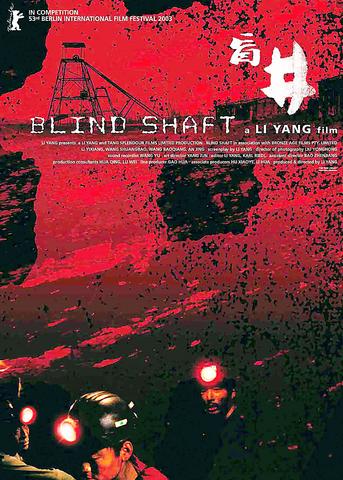This year's Berlin Film Festival may be a disappointing one for Chinese-language films, but perhaps a very promising beginning for Chinese director Li Yang (李楊) and his German-Chinese co-production Blind Shaft (盲井).
The film earned Li a Silver Bear for artistic contribution at the festival, making it one of only two Chinese-language films to win an award at the 2003 Berlinale (the other being Zhang Yi-mou's Hero).

PHOTO COURTESY OF THE FILM LIBRARY
Unlike Hero, with its stunning cinematography and fancy kung fu, Blind Shaft is a realistic drama portraying the dangerous coal mines and the equally dangerous human behaviors of greed, treachery and murder.
This documentary-like film is Li's feature film debut, and it made an impressive appearance in the Berlinale's competition section, both in its revelation of the harsh life at the bottom rungs of Chinese society and in its comic twist at the end of the story.
In China, there are reportedly 7,000 coal miners killed in accidents each year. And in many cases, miners' bodies are cremated and buried without the victim's families ever being notified.
The circumstances surrounding these accidents -- the most famous of which occurred in Guangxi in 2001 -- are rarely made public, as many mines are illegal and corrupt local officials (who take bribes from the mines' owners) do not want such details made public.
Li Yang's film is a fictionalized account of one such accident. Two mine workers in a run-down illegal mine have killed one of their fellow miners, a man they had previously introduced to the job as their "relative." They make the death look like an accident and extort compensation from the mine's owner for the death of their "relative," threatening to report the accident to the public.
Returning home with their loot, the two murderers seek another victim. This time they find a 16-year-old peasant boy. The two ask him to introduce himself to the mine's management as a relative of theirs, because they say it will be easier for him to get a job that way. The real scheme is to arrange another accidental death and demand compensation for another deceased "family member."
"What is portrayed here is no deliberate melodrama or dramatization. It's a real story," said the 44-year-old director, who has made three documentaries prior to this feature film.
Making the movie was nearly as hazardous a venture as mining. As many of the owners of illegal mines and corrupt bureaucrats would not have welcomed an effort to dig up the dirt on their businesses, Li and his crew were risking their lives when they filmed 700m underground in the mines of Shaanxi Province.
"One time, I was surrounded by the owners of a mine and [armed] police, and they threatened to take me away," Li said. And of course, the film is banned in China, something which has given it a higher profile abroad.
After Berlin, Blind Shaft goes to Cannes to be screened in the Director's Fortnight section and is expected to be distributed throughout Asia, with one notable exception.

Cheng Ching-hsiang (鄭青祥) turned a small triangle of concrete jammed between two old shops into a cool little bar called 9dimension. In front of the shop, a steampunk-like structure was welded by himself to serve as a booth where he prepares cocktails. “Yancheng used to be just old people,” he says, “but now young people are coming and creating the New Yancheng.” Around the corner, Yu Hsiu-jao (饒毓琇), opened Tiny Cafe. True to its name, it is the size of a cupboard and serves cold-brewed coffee. “Small shops are so special and have personality,” she says, “people come to Yancheng to find such treasures.” She

Late last month Philippines Foreign Affairs Secretary Theresa Lazaro told the Philippine Senate that the nation has sufficient funds to evacuate the nearly 170,000 Filipino residents in Taiwan, 84 percent of whom are migrant workers, in the event of war. Agencies have been exploring evacuation scenarios since early this year, she said. She also observed that since the Philippines has only limited ships, the government is consulting security agencies for alternatives. Filipinos are a distant third in overall migrant worker population. Indonesia has over 248,000 workers, followed by roughly 240,000 Vietnamese. It should be noted that there are another 170,000

In July of 1995, a group of local DJs began posting an event flyer around Taipei. It was cheaply photocopied and nearly all in English, with a hand-drawn map on the back and, on the front, a big red hand print alongside one prominent line of text, “Finally… THE PARTY.” The map led to a remote floodplain in Taipei County (now New Taipei City) just across the Tamsui River from Taipei. The organizers got permission from no one. They just drove up in a blue Taiwanese pickup truck, set up a generator, two speakers, two turntables and a mixer. They

Hannah Liao (廖宸萱) recalls the harassment she experienced on dating apps, an experience that left her frightened and disgusted. “I’ve tried some voice-based dating apps,” the 30-year-old says. “Right away, some guys would say things like, ‘Wanna talk dirty?’ or ‘Wanna suck my d**k?’” she says. Liao’s story is not unique. Ministry of Health and Welfare statistics show a more than 50 percent rise in sexual assault cases related to online encounters over the past five years. In 2023 alone, women comprised 7,698 of the 9,413 reported victims. Faced with a dating landscape that can feel more predatory than promising, many in